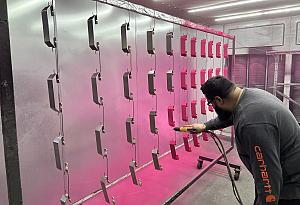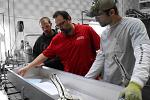Senior Editor
- FMA
- The Fabricator
- FABTECH
- Canadian Metalworking
Categories
- Additive Manufacturing
- Aluminum Welding
- Arc Welding
- Assembly and Joining
- Automation and Robotics
- Bending and Forming
- Consumables
- Cutting and Weld Prep
- Electric Vehicles
- En Español
- Finishing
- Hydroforming
- Laser Cutting
- Laser Welding
- Machining
- Manufacturing Software
- Materials Handling
- Metals/Materials
- Oxyfuel Cutting
- Plasma Cutting
- Power Tools
- Punching and Other Holemaking
- Roll Forming
- Safety
- Sawing
- Shearing
- Shop Management
- Testing and Measuring
- Tube and Pipe Fabrication
- Tube and Pipe Production
- Waterjet Cutting
Industry Directory
Webcasts
Podcasts
FAB 40
Advertise
Subscribe
Account Login
Search
The thinking worker in manufacturing
- By Tim Heston
- July 8, 2010
That’s where the government has stepped in. Of course, government can’t do much immediately. Local and national politicians have said they want to push for improvements in education, but the money isn’t there for anything dramatic—like completely overhaul education to improve America’s skilled work force—and they certainly can’t raise taxes, or they’ll never get reelected. So the best the government could do immediately was to hire a bunch of temporary census workers. And for many, that stint of employment has ended, which led to June’s lackluster unemployment report.
Politicians have an odd, almost outdated relationship with manufacturing. This is just a hunch, but I think many inside the beltway characterize manufacturing jobs as something different than they really are. They work by the stereotype, the “all-American worker” who can feed a family by going to work at an all-American plant complete with that all-American flag on the wall.
There’s a darker side to this, though. It’s been said that, historically, the reason why politicians love manufacturing is that the industry provides jobs and education. They don’t risk losing an election by raising taxes to fix public education. Manufacturing companies used to hire and train people who brought little or no previous skill to the table. In the past, pre-globalization world, manufacturers could afford to take the burden of education off the government’s plate. I alluded to this in a January blog.
The reality is different today. Thanks to automation and lean manufacturing, companies have increased efficiency and production capacity without hiring more people. And when they do need people, they need people with skill. When these souls enter the plant, they won’t spend their life welding in one work area, using one process, welding one way. If they climb the ladder even one or two rungs, they’ll likely learn the basics of many if not all the processes on the plant floor. If they’re not cross trained, they’ll at least be expected to think a bit more about part flow and about better ways this or that work cell could operate. They need to know the technical aspects of their own job, plus the basics of manufacturing strategy to ensure any improvement they dream up benefits the whole operation.
In other words, manufacturing workers aren’t untrained drones. They’re skilled professionals who happen to be working inside a plant instead of an office. Manufacturers want trained people, and government is having a tough time meeting that need. High school teachers are being furloughed; technical schools and colleges are cutting back. They’ve always struggled; even during good times, not many schools could afford modern laser cutting and punching machines, for instance. But today, they can’t even afford the teachers, let alone the machines.
As we ramp up during this recovery, the best companies are finding ways to get by with fewer employees. That’s been the basic drive of lean manufacturing: to increase capacity without adding people, machines, or real estate. At least ideally, the more value and profit a company makes per employee, the more stable employment becomes. Of course, this doesn’t provide a quick fix for the nation’s unemployment rate.
In recent months politicians, including our president, have spent some time making speeches in manufacturing plants. Interestingly, you don’t see many politicians making speeches inside many Walmarts. Bargain retailers seem to be one of the last places unskilled people can find work. They’re huge employers that provide basic training, and they don’t demand much from government, at least when it comes to providing advanced education for their employees.
This might change in a few decades, though. Any time I see someone getting paid for a somewhat simple, repetitive task all day every day, I wonder if technology will eliminate that job one day. Consider checkout personnel. Today, right next to them, you’ll see those automated checkout lanes. I can’t stand them, personally—my wife has laughed at me fighting with those dang machines. But in 50 years, the process may be refined so much that checking out via a machine may come naturally to everyone.
Walmart may be realizing that the retail business is changing. They’ve partnered with American University, which is offering online education at a discount to Walmart employees. Sure, there are skeptics who say American University and other for-profit institutions don’t provide the skill people need to succeed. But Walmart’s investment in education is interesting all the same.
Maybe in 50 years or so, retail will follow the path of manufacturing. No longer will it need unskilled people. Checkout will be automated. They’ll need highly trained people who understand retail floor layout, the subtleties of customer service, and the complications behind a seamless supply chain.
By that time, politicians will be standing by checkout lines, pining for the days of the “old fashioned retail operation” that offered those “real American jobs”—ones that take the burden of education and training off politicians' shoulders, so they don’t have to raise taxes, so they can get reelected.
OK, I’ve reached some stratospheric levels of pessimism here, I know. I just hope one day that “real American worker” stereotype used in political speeches reflects the people who truly drive GDP; those who work—and think—for a living.
subscribe now

The Fabricator is North America's leading magazine for the metal forming and fabricating industry. The magazine delivers the news, technical articles, and case histories that enable fabricators to do their jobs more efficiently. The Fabricator has served the industry since 1970.
start your free subscriptionAbout the Author

Tim Heston
2135 Point Blvd
Elgin, IL 60123
815-381-1314
Tim Heston, The Fabricator's senior editor, has covered the metal fabrication industry since 1998, starting his career at the American Welding Society's Welding Journal. Since then he has covered the full range of metal fabrication processes, from stamping, bending, and cutting to grinding and polishing. He joined The Fabricator's staff in October 2007.
- Stay connected from anywhere

Easily access valuable industry resources now with full access to the digital edition of The Fabricator.

Easily access valuable industry resources now with full access to the digital edition of The Welder.

Easily access valuable industry resources now with full access to the digital edition of The Tube and Pipe Journal.
- Podcasting
- Podcast:
- The Fabricator Podcast
- Published:
- 04/16/2024
- Running Time:
- 63:29
In this episode of The Fabricator Podcast, Caleb Chamberlain, co-founder and CEO of OSH Cut, discusses his company’s...
- Industry Events
16th Annual Safety Conference
- April 30 - May 1, 2024
- Elgin,
Pipe and Tube Conference
- May 21 - 22, 2024
- Omaha, NE
World-Class Roll Forming Workshop
- June 5 - 6, 2024
- Louisville, KY
Advanced Laser Application Workshop
- June 25 - 27, 2024
- Novi, MI































